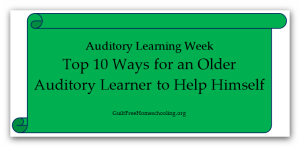 These tips will be helpful to auditory students in middle school, high school, college, or beyond, who need to motivate themselves and control their own learning environments.
These tips will be helpful to auditory students in middle school, high school, college, or beyond, who need to motivate themselves and control their own learning environments.
- Read difficult material aloud in your own room to help you concentrate, and you’ll know exactly when you get distracted. Read notes aloud and/or recite aloud to study for tests.
- Use Mom or a sibling for a student, and explain a concept or principle to them, because the best way to learn something fully yourself is to teach it to someone else. Talk it through – whether organizing thoughts for a major paper, solving a tough math problem, or learning an economics principle, discussing it aloud (even with yourself) can make a huge difference in understanding. Hearing the ideas can make much more sense than just silently reading them. Record yourself explaining the concept, then play it back, if simply talking out loud isn’t enough.
- Listen to music (at low volume) while studying. Use music you already know well, so you won’t pay close attention to the lyrics. Change to a different style of music or a different artist when you change subjects, as a memory key. (I was listening to Big Band Swing, while studying my history notes… and I put this date right into that Glenn Miller song, Pennsylvania 6-5-0-0-0… it’s “November 2-2, 1-9-6-3!! Movies or TV shows (on DVD or reruns) can also work as background “white noise,” but make it something you are very familiar with. You don’t want to get distracted by trying to follow a new plot.
- Make rhythmic poems or raps out of lists or other info that must be memorized, or sing the information to a simple, familiar tune.
- Use an accent. Your ears are attuned to even subtle differences in sounds, so reading aloud or talking to yourself with a fake accent will actually help your brain focus. For even more help, change accents when you change subjects.
- Watching the video version of a book first can help hold your interest while you read the book later. You’ll hear the actors’ voices in your head when you read it.
- Look up a topic on social media, such as Instagram, Vine, You Tube, etc. as another way to hear it.
- Act it out.
- Play an instrument while studying, whether as a quick break or as your own “background music.” Rhythmically drumming your fingers counts, as does strumming guitar while watching a video.
- Incorporate learning methods from the other 3 styles to improve your overall learning abilities.
For further help, visit these links:
Learning Styles v. It’s a Syndrome
“Auditory Learning” topic (including all of this “Auditory Learning Week” series)
“Learning Styles” topic


 Guilt-Free Homeschooling is the creation of Carolyn Morrison and her daughter, Jennifer Leonhard. After serious disappointments with public school, Carolyn spent the next 11 years homeschooling her two children, from elementary to high school graduation and college admission. Refusing to force new homeschooling families to re-invent the wheel, Carolyn and Jennifer now share their encouragement, support, tips, and tricks, filling their blog with "all the answers we were looking for as a new-to-homeschooling family" and making this website a valuable resource for parents, not just a daily journal. Guilt-Free Homeschooling -- Equipping Parents for Homeschooling Success!
Guilt-Free Homeschooling is the creation of Carolyn Morrison and her daughter, Jennifer Leonhard. After serious disappointments with public school, Carolyn spent the next 11 years homeschooling her two children, from elementary to high school graduation and college admission. Refusing to force new homeschooling families to re-invent the wheel, Carolyn and Jennifer now share their encouragement, support, tips, and tricks, filling their blog with "all the answers we were looking for as a new-to-homeschooling family" and making this website a valuable resource for parents, not just a daily journal. Guilt-Free Homeschooling -- Equipping Parents for Homeschooling Success!

Speak Your Mind